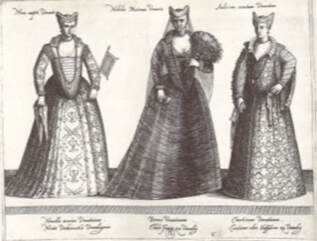|
In Capitolo 16, Franco argues that any general weakness found in women comes from a lack of resources and opportunity and not from their nature. Franco wrote this poem as a response to Maffio Venier, a poet who publicly defamed her in his work. She writes,
Franco argues that, given proper “weapons and training,” women would have the same “hands and feet and hearts” as men. While defending the strength of women, Franco confronts an essentialist approach to the sexes. She challenges the idea that qualities like strength and delicacy are mutually exclusive and that either of them belong only to a single sex. She explains that in the same way we find tough, yet cowardly men, we can find delicate and strong women. Seeing women as weaker than men because of their general delicacy, then, fails to capture the complexity of each person as an individual. Franco sees the attack of Maffio as an attack on all women. She promises to “defend all women/ against” men like her attacker and to serve as “an example for them all to follow.” (79-80) In this role, Franco describes how she came to know her own strength. According to Franco, many women, because they lack the right training and tools, feel that they are weaker than men. She writes, “Women so far haven’t seen this is true;/ for if they’d ever resolved to do it,/ they’d have been able to fight you to death.” (70-72) Even Franco admits to feeling “defenseless” and vulnerable to the attacks of men. (22) Yet, after “devoting all [her] efforts to arms,” she came to “no longer fear harm from anyone.” (37-39) Her newfound security taught Franco “that women by nature are no less agile than men.” (34-36) In sharing her own experience, Franco argues that women can escape positions of vulnerability if they are given the same opportunities and resources as men. I think it is important to note that Franco does not ultimately challenge her attacker to a physical fight. Instead, she defends herself as an intellectual. Franco trains with the metaphorical “arms” of language in preparation for this fight. She tells Maffio that he can choose any language to battle in as she is “equally happy with them all,/ since [she has] learned them for exactly this purpose.” (126-127) She describes her attacker’s weapon as, “The sword that strikes and stabs in [his] hand—/ the common language spoken in Venice” and says that she will also fight using her rhetoric. (112-114) Towards the end of the poem she writes,
By defending herself as a skilled writer while serving as a champion of all women, she defends the intellectual capacities of her sex. Franco also highlights how her education and the chance to “practice” her craft has prepared her to win this fight. Again, she shows how the right resources can prepare a woman for any kind of combat against a man. As seen in my previous post, Franco believes that virtue is not found in bodily strength, but in the “vigor of the soul and mind.” (Capitolo 24, 61-62) Thus, in choosing to ultimately defend her superior intellect instead of focusing merely on physical strength, Franco reinforces the argument that women excel in virtue as seen in their superior reason. -MP Image info: Newlywed Venetian Bride, Noble Venetian Matron, Venetian Courtesan (engraving) Anonymous Bibliotheque Nationale, Paris. Lawner. https://venice11.umwblogs.org/venetian-attire-similarities-between-courtesans-and-aristocratic-women/#_edn
1 Comment
|
Authors
Jacinta Shrimpton is a PhD student in Philosophy at the University of Sydney. She is co-producer of the ENN New Voices podcast Archives
May 2024
Categories
All
|

 RSS Feed
RSS Feed